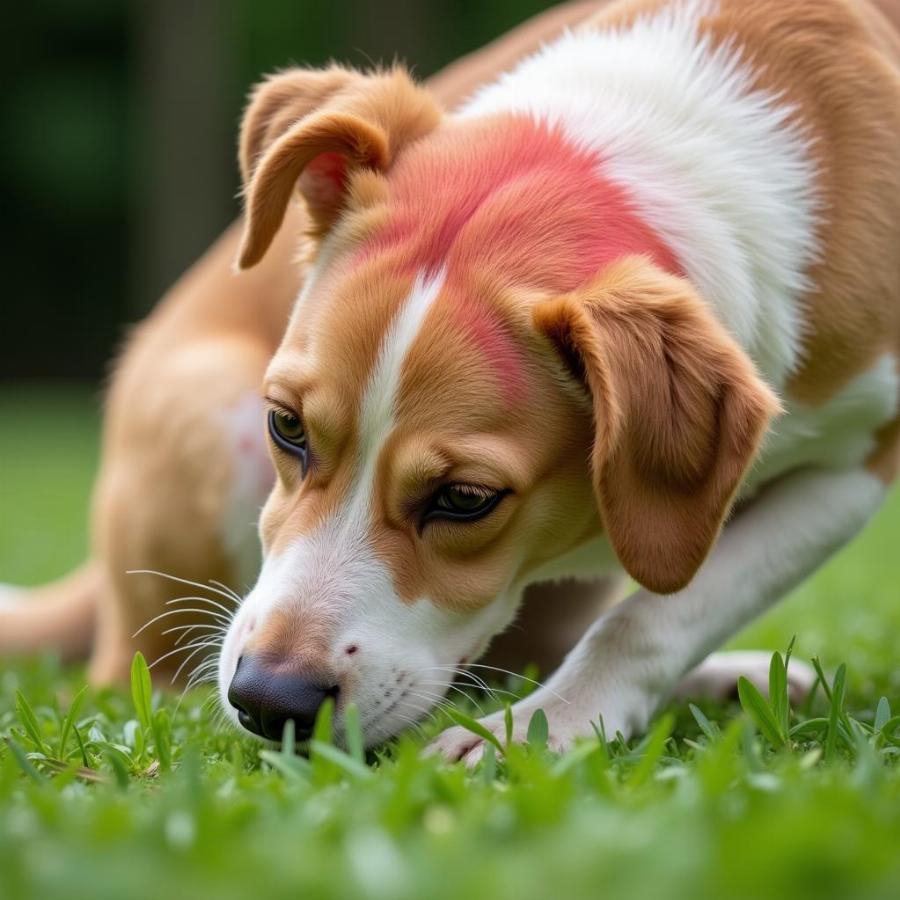Grass allergies in dogs can be a frustrating experience for both pet and owner. Itching, scratching, and licking can disrupt your furry friend’s happy demeanor, leaving you searching for solutions. This comprehensive guide will delve into the causes, symptoms, and treatment options for allergic reactions to grass in dogs, empowering you to provide the best care for your canine companion.
Understanding Grass Allergies in Dogs
So, what exactly causes an allergic reaction to grass in dogs? It’s not the grass itself, but rather the pollen and other microscopic organisms that cling to it. These allergens trigger an immune response in sensitive dogs, leading to a variety of uncomfortable symptoms. Understanding this process is the first step towards effective management.
Common Symptoms of Grass Allergies
- Excessive itching and scratching: Your dog may scratch incessantly, especially at their paws, belly, and ears.
- Red, inflamed skin: The constant scratching can lead to skin irritation and inflammation.
- Hair loss: Patches of hair loss may appear in areas where your dog frequently scratches.
- Licking and chewing paws: This is a classic sign of paw irritation due to grass allergies.
- Sneezing and runny nose: While less common, some dogs may also experience respiratory symptoms.
 Chó bị dị ứng cỏ
Chó bị dị ứng cỏ
Diagnosing Grass Allergies
If you suspect your dog has a grass allergy, it’s important to consult a veterinarian. They can perform tests to rule out other conditions and confirm the diagnosis. This will ensure your dog receives the appropriate treatment.
Veterinary Testing for Grass Allergies
Your vet may conduct skin or blood tests to identify the specific allergen causing your dog’s reaction. These tests can be invaluable in developing a tailored treatment plan.
Treatment and Management of Grass Allergies
Fortunately, there are various ways to manage and alleviate grass allergies in dogs. These range from preventative measures to medications and alternative therapies.
Preventative Measures
- Limit exposure to grass: Avoid walking your dog in grassy areas during peak pollen season.
- Wipe down your dog’s paws and coat: After walks, use a damp cloth to remove pollen and other allergens.
- Frequent bathing: Regular baths with a hypoallergenic shampoo can help soothe irritated skin and remove allergens.
- best bug repellent for dogs Using a bug repellent can help prevent bites that can exacerbate skin irritation.
Medications for Grass Allergies
- Antihistamines: These can help reduce itching and inflammation.
- Steroids: In more severe cases, your vet may prescribe steroids to control the allergic reaction.
- Immunotherapy: This involves gradually exposing your dog to small amounts of the allergen to build up their tolerance.
Alternative Therapies
Some pet owners have found success with alternative therapies such as:
- Omega-3 fatty acid supplements: These can help improve skin health and reduce inflammation.
- flea and tick chews for dogs These can help control secondary infections from flea and tick bites, which can worsen allergies.
- Medicated shampoos and conditioners: These can soothe irritated skin and provide relief from itching.
What can I give my dog for a grass allergy?
Your veterinarian can recommend the best course of treatment, which might include antihistamines, steroids, or immunotherapy. Never self-medicate your dog.
How can I tell if my dog is allergic to grass?
Look for signs like excessive itching, scratching, red skin, hair loss, and paw licking. A vet can confirm the allergy through testing.
Can a dog’s grass allergy go away?
While grass allergies can be managed, they rarely completely disappear. Consistent treatment and preventative measures are usually necessary.
Conclusion
Dealing with grass allergies in dogs requires patience and a proactive approach. By understanding the causes, symptoms, and available treatment options, you can help your furry friend live a comfortable and itch-free life. Remember to consult your veterinarian for an accurate diagnosis and a personalized treatment plan.
FAQ
- Can puppies be allergic to grass? Yes, grass allergies can develop at any age, even in puppies.
- Is there a cure for grass allergies in dogs? While there’s no cure, the allergy can be effectively managed with proper treatment.
- Are certain breeds more prone to grass allergies? Some breeds, like Terriers and Retrievers, are believed to be more susceptible.
- What’s the difference between a food allergy and a grass allergy? Food allergies typically cause digestive issues, while grass allergies primarily affect the skin and sometimes the respiratory system.
- Can I use human allergy medication on my dog? No, never give your dog human medication without consulting your vet.
- How often should I bathe my dog if they have a grass allergy? Your vet can recommend a bathing schedule, which may be more frequent during allergy season.
- Are there any home remedies for grass allergies in dogs? While some home remedies may offer temporary relief, it’s essential to consult your vet for proper diagnosis and treatment.
Do you have other questions? Check out these related articles:
Beaut Dogs is your trusted source for all things canine, providing reliable and in-depth information to help you understand and care for your furry companion. From breed-specific insights to expert advice on health, nutrition, and training, Beaut Dogs is here to support you every step of the way. When you need assistance, please contact us via Email at [email protected] to get detailed and accurate answers from Beaut Dogs.